Coronary heart disease (CHD) is the leading cause of death in the United States, killing more than 600,000 people each year. CHD occurs when the arteries that supply blood to the heart become narrowed or blocked. This can lead to a heart attack, which occurs when the blood supply to the heart is cut off.

There are many risk factors for CHD, including:
- High blood pressure
- High cholesterol
- Diabetes
- Smoking
- Obesity
- Physical inactivity
- Family history of CHD
However, not everyone who has these risk factors will develop CHD. In fact, many people who have no known risk factors will still develop the disease. This is because there are other factors that can contribute to CHD, including:
- Inflammation: Inflammation is a natural response to injury or infection. However, chronic inflammation can damage the arteries and increase the risk of CHD.
- Oxidative stress: Oxidative stress is a process that can damage cells and tissues. It is caused by exposure to free radicals, which are unstable molecules that can damage DNA and other cell components. Oxidative stress can increase the risk of CHD by damaging the arteries and promoting inflammation.
- Genetics: Some people are more likely to develop CHD than others due to their genes. However, genes are not the only factor that determines whether or not someone will develop CHD. Lifestyle factors, such as diet and exercise, can also play a role.
How to Prevent CHD
There is no surefire way to prevent CHD, but there are many things you can do to reduce your risk. These include:
- Eating a healthy diet: A healthy diet is low in saturated fat, cholesterol, and sodium. It is also high in fruits, vegetables, and whole grains.
- Getting regular exercise: Exercise helps to lower blood pressure, cholesterol, and blood sugar levels. It also helps to reduce inflammation and oxidative stress.
- Maintaining a healthy weight: Being overweight or obese increases your risk of CHD.
- Quitting smoking: Smoking is the single most important thing you can do to reduce your risk of CHD.
- Managing your blood pressure: High blood pressure is a major risk factor for CHD. If you have high blood pressure, talk to your doctor about medication or lifestyle changes that can help you lower it.
- Managing your cholesterol: High cholesterol is a major risk factor for CHD. If you have high cholesterol, talk to your doctor about medication or lifestyle changes that can help you lower it.
- Managing your diabetes: Diabetes is a major risk factor for CHD. If you have diabetes, talk to your doctor about medication or lifestyle changes that can help you manage it.
Common Mistakes to Avoid
There are some common mistakes that people make when trying to reduce their risk of CHD. These include:
- Ignoring the importance of diet: Diet is one of the most important factors in preventing CHD. However, many people do not eat a healthy diet. They may eat too much saturated fat, cholesterol, and sodium. They may also not eat enough fruits, vegetables, and whole grains.
- Not getting enough exercise: Exercise is another important factor in preventing CHD. However, many people do not get enough exercise. They may not have time to exercise or they may not enjoy it.
- Smoking: Smoking is the single most important thing you can do to increase your risk of CHD. However, many people continue to smoke. They may not realize the risks of smoking or they may not be able to quit.
- Not managing your blood pressure: High blood pressure is a major risk factor for CHD. However, many people do not manage their blood pressure. They may not know they have high blood pressure or they may not take their medication as prescribed.
- Not managing your cholesterol: High cholesterol is a major risk factor for CHD. However, many people do not manage their cholesterol. They may not know they have high cholesterol or they may not take their medication as prescribed.
- Not managing your diabetes: Diabetes is a major risk factor for CHD. However, many people do not manage their diabetes. They may not know they have diabetes or they may not take their medication as prescribed.
Conclusion
CHD is a serious disease, but it can be prevented. By following the tips in this article, you can reduce your risk of developing CHD.
Additional Information
Here are some additional resources that you may find helpful:
- The American Heart Association: http://www.heart.org
- The National Heart, Lung, and Blood Institute: http://www.nhlbi.nih.gov
- The Centers for Disease Control and Prevention: http://www.cdc.gov
Tables
Table 1: Risk Factors for CHD
| Risk Factor | Description |
|---|---|
| High blood pressure | Blood pressure that is consistently above 140/90 mmHg |
| High cholesterol | High levels of LDL (bad) cholesterol or low levels of HDL (good) cholesterol |
| Diabetes | A condition in which the body does not produce enough insulin or does not use insulin well |
| Smoking | The act of inhaling tobacco smoke |
| Obesity | A condition in which a person has excess body fat |
| Physical inactivity | Not getting enough exercise |
| Family history of CHD | Having a parent, sibling, or child who has CHD |
Table 2: Symptoms of CHD
| Symptom | Description |
|---|---|
| Chest pain | Pain in the chest that can feel like pressure, squeezing, or burning |
| Shortness of breath | Difficulty breathing |
| Fatigue | Feeling tired or weak |
| Lightheadedness | Feeling dizzy or faint |
| Pain in the arms, neck, or back | Pain that radiates from the chest to the arms, neck, or back |
Table 3: Treatment for CHD
| Treatment | Description |
|---|---|
| Medications | Medications can be used to lower blood pressure, cholesterol, and blood sugar levels. They can also be used to relieve chest pain and shortness of breath. |
| Surgery | Surgery may be necessary to repair damaged arteries or to bypass blocked arteries. |
| Lifestyle changes | Lifestyle changes, such as eating a healthy diet, getting regular exercise, and quitting smoking, can help to reduce the risk of CHD. |
Table 4: Prevention of CHD
| Prevention | Description |
|---|---|
| Eat a healthy diet | A healthy diet is low in saturated fat, cholesterol, and sodium. It is also high in fruits, vegetables, and whole grains. |
| Get regular exercise | Exercise helps to lower blood pressure, cholesterol, and blood sugar levels. It also helps to reduce inflammation and oxidative stress. |
| Maintain a healthy weight | Being overweight or obese increases your risk of CHD. |
| Quit smoking | Smoking is the single most important thing you can do to reduce your risk of CHD. |
| Manage your blood pressure | High blood pressure is a major risk factor for CHD. If you have high blood pressure, talk to your doctor about medication or lifestyle changes that can help you lower it. |
| Manage your cholesterol | High cholesterol is a major risk factor for CHD. If you have high cholesterol, talk to your doctor about medication or lifestyle changes that can help you lower it. |
| Manage your diabetes | Diabetes is a major risk factor for CHD. If you have diabetes, talk to your doctor about medication or lifestyle changes that can help you manage it. |
















